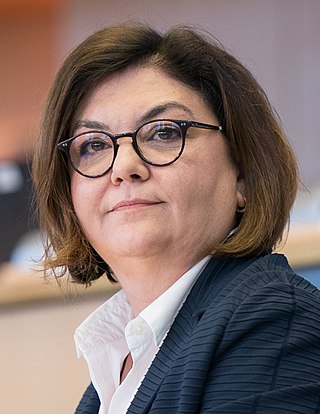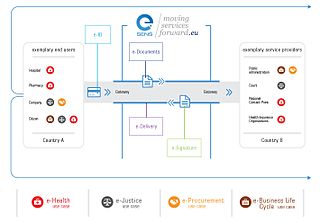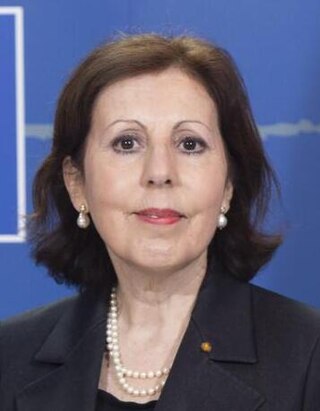
Anders Gunnar Hökmark is a Swedish politician who served as a Member of the European Parliament (MEP) from 2004 until 2019. He is member of the Moderate Party, part of the European People's Party. He previously served as Secretary of the Moderate Party from 1991 to 1999 and Member of the Riksdag (MP) for Stockholm County from 1982 to 2004.

The Energy Community, commonly referred to as the Energy Community for South East Europe (ECSEE), is an international organization consisting of the European Union (EU) and a number of non-EU countries. It aims to extend the EU internal energy market to wider Southeast Europe. The members commit to implement relevant EU energy acquis communautaire, to develop an adequate regulatory framework and to liberalize their energy markets in line with the acquis under the founding Treaty.
European Standards, sometimes called Euronorm, are technical standards which have been ratified by one of the three European Standards Organizations (ESO): European Committee for Standardization (CEN), European Committee for Electrotechnical Standardization (CENELEC), or European Telecommunications Standards Institute (ETSI). All ENs are designed and created by all standards organizations and interested parties through a transparent, open, and consensual process.
Government procurement or public procurement is undertaken by the public authorities of the European Union (EU) and its member states in order to award contracts for public works and for the purchase of goods and services in accordance with principles derived from the Treaties of the European Union. Such procurement represents 13.6% of EU GDP as of March 2023, and has been the subject of increasing European regulation since the 1970s because of its importance to the European single market.

Directive 2003/30/EC was a European Union directive for promoting the use of biofuels for EU transport. The directive entered into force in May 2003, and stipulated that national measures must be taken by countries across the EU aiming at replacing 5.75% of all transport fossil fuels with biofuels by 2010. The directive also called for an intermediate target of 2% by 31 December 2005. The target of 5.75% was to be met by 31 December 2010. These percentages were to be calculated on the basis of energy content of the fuel and were to apply to petrol and diesel fuel for transport purposes placed on the markets of member states. Member states were encouraged to take on national "indicative" targets in conformity with the overall target.

Adina-Ioana Vălean is a Romanian politician who has been serving as European Commissioner for Transport under the leadership of President of the European Commission Ursula von der Leyen since 2019. She previously served as a Member of the European Parliament from 2007 until 2019, where she chaired of the European Parliament Committee on Industry, Research and Energy in 2019.

The energy policy of the European Union focuses on energy security, sustainability, and integrating the energy markets of member states. An increasingly important part of it is climate policy. A key energy policy adopted in 2009 is the 20/20/20 objectives, binding for all EU Member States. The target involved increasing the share of renewable energy in its final energy use to 20%, reduce greenhouse gases by 20% and increase energy efficiency by 20%. After this target was met, new targets for 2030 were set at a 55% reduction of greenhouse gas emissions by 2030 as part of the European Green Deal. After the Russian invasion of Ukraine, the EU's energy policy turned more towards energy security in their REPowerEU policy package, which boosts both renewable deployment and fossil fuel infrastructure for alternative suppliers.
The Energy Performance of Buildings Directive is the European Union's main legislative instrument aiming to promote the improvement of the energy performance of buildings within the European Union. It was inspired by the Kyoto Protocol which commits the EU and all its parties by setting binding emission reduction targets.
GNSS road pricing or GNSS-based tolling is the charging of road users using Global Navigation Satellite System (GNSS) sensors inside vehicles. Road pricing using GNSS simplifies distance-based tolling for all types of roads in a tolled road network since it does not require the installation and operation of roadside infrastructure, such as tollbooths or microwave-based toll gantries. Instead, all vehicles required to pay the distance-based fees are equipped with an On Board Unit (OBU).
The Telecoms Package was the review of the European Union Telecommunications Framework from 2007 – 2009. The objective of the review was to update the EU Telecoms Framework of 2002 and to create a common set of regulations for the telecoms industry across all 27 EU member states. The review consisted of a package of directives addressing the regulation of service provision, access, interconnection, users' contractual rights and users' privacy, as well as a regulation creating a new European regulatory body (BEREC).

Esther M. R. de Lange is a Dutch politician who served as a Member of the European Parliament (MEP) between 2007 and 2024. A member of the Christian Democratic Appeal (CDA), part of the European People's Party (EPP), she was elected as delegation leader in the European Parliament at a party conference on 2 November 2013 in Leeuwarden, a position she assumed the following year. In July 2014 she was elected as Vice President of the EPP Group in the European Parliament and in June 2018 as Vice President of the EPP Party. De Lange stepped down as MEP in February 2024.

The Body of European Regulators for Electronic Communications (BEREC) is the body in which the regulators of the telecommunications markets in the European Union work together. Other participants include representatives of the European Commission, as well as telecommunication regulators from the member states of the EEA and of states that are in the process of joining the EU.

The common external power supply was a European Commission (EC) specification for a universal charger for smartphones sold within the European Union. The specification included the use of a USB Micro-B connector and adherence to the USB Battery Charging Specification.

Seb Dance, born 1 December 1981, is a British Labour Party politician who served as a Member of the European Parliament (MEP) for the London region from 2014 to 2020 and since January 2022 serves as Deputy Mayor of London for transport.

The term digital single market refers to the policy objective of eliminating national or other jurisdictional barriers to online transactions, building on the common market concept designed to remove trade barriers in other commercial fields.
Made in EU was proposed by the European Commission in 2014. The Made in the EU label would indicate the product is mainly made in the European Union.
The Net Neutrality Regulation 2015 is a Regulation in EU law where article 3(3) lays down measures concerning open internet access.

Maria da Graça Martins da Silva Carvalho is a Portuguese professor, engineer, and politician of the Social Democratic Party who has been serving as Minister of Environment and Energy in the government of Prime Minister Luís Montenegro since 2024.
The Electronic Communications Code Directive is a directive in EU law, which regulates electronic communications networks and services.









